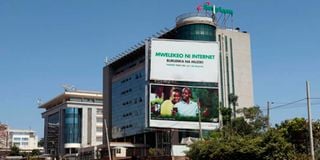Safaricom faces Sh3bn loss in tariff review

Safaricom head office in Nairobi on March 20, 2022.
What you need to know:
- Telecommunications regulator is planning to reduce the Mobile Tariff Rates from the current Sh0.99 to Sh0.12 .
- Safaricom, which has been receiving roughly Sh3.5 billion annually, will be left with a paltry Sh106 million.
A row over claims of market dominance puts Safaricom at risk of a potential loss of Sh3.1billion in annual revenue even as the regulator presses on with call tariff cuts to level the playing field in the telcos sector.
The planned cut of Mobile Tariff Rates (MTR) from the current Sh0.99 to Sh0.12 will save Airtel and Telkom Sh2.97 billion and Sh404 million respectively in annual MTR costs, while Safaricom, which has been receiving roughly Sh3.5 billion annually, will be left with a paltry Sh106 million.
Appearing before Senate’s Information and Communication Technology (ICT) Committee yesterday, ICT Cabinet Secretary Joe Mucheru said the rates applied for the past five years had seen Safaricom make billions it should never have made, while its competitors suffered huge unnecessary costs that affected their competitiveness.
Mr Mucheru told senators that, when the Communications Authority of Kenya (CA) last year analysed MTR rates, it realised the money Safaricom had been making in interconnection fees was more than seven times its rightful share.
“Noting that termination rates are not meant to be income-generating streams but cost recovery mechanisms, [CA] observed that, due to current imbalance in off-net traffic volumes, in a quarter, about Sh1.005 billion is paid out among operators as interconnection fees. The net beneficiary is Safaricom PLC, which received Sh883 million while the net losers are Airtel Kenya and Telkom Kenya, which pay out Sh845 million and Sh115 million respectively,” the CS said.
In the written response to senators, Mr Mucheru accused Safaricom of generating revenues from the interconnection fees, yet the MTR rates are meant to allow service providers recover the costs incurred when other players use their infrastructure.
The Sh0.99 MTR rate applicable today has never been reviewed since 2014, even though CA ought to have conducted annual MTR rate reviews.
Since July last year when CA announced plans to cut the rates by more than 87 per cent, rifts within the telecommunications sector have widened, with CA and small players taking on Safaricom over Sh3.5 billion.
Going by the one-quarter figures issued by the ministry, it is estimated that in four quarters, Safaricom makes an average of Sh3.5 billion from its competitors for use of its infrastructure.
If 87.9 per cent were to be taken from the figure, the telco would be left with Sh427.5 million. Senators blamed the CA for failure to conduct annual MTR reviews, which would have unearthed the details earlier.
“Why did it take too long to review the rates when other countries have done better? Why take 10 years? Hasn’t the delay created the alleged monopoly of Safaricom?” nominated Senator Petronila Were asked.
And, while in his verbal response the CS blamed budgetary issues for the delay, in the written responses to Parliament, the ministry said that, when applicability of the Sh0.99 rates lapsed in 2015, “the [CA] took a decision to observe the market and see how the market would react before proceeding to undertake another costing study”.
Mr Mucheru, however, denied that the imbalance in off-net traffic volumes could have helped Safaricom increase its market share to the disadvantage of its competitors, arguing that the figures involved are too little to impact the Sh300 billion telecommunications sector.





